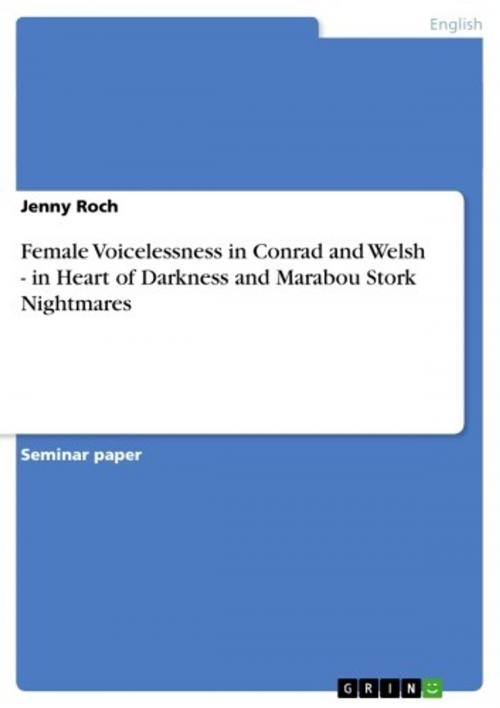Female Voicelessness in Conrad and Welsh - in Heart of Darkness and Marabou Stork Nightmares
in Heart of Darkness and Marabou Stork Nightmares
Fiction & Literature, Literary Theory & Criticism, British| Author: | Jenny Roch | ISBN: | 9783638466646 |
| Publisher: | GRIN Verlag | Publication: | February 8, 2006 |
| Imprint: | GRIN Verlag | Language: | English |
| Author: | Jenny Roch |
| ISBN: | 9783638466646 |
| Publisher: | GRIN Verlag |
| Publication: | February 8, 2006 |
| Imprint: | GRIN Verlag |
| Language: | English |
Seminar paper from the year 2006 in the subject English Language and Literature Studies - Literature, grade: A5 (18/22), University of Glasgow (Department of English Literature), course: Module T4 - Postcolonialism: Writing and Theory, 10 entries in the bibliography, language: English, abstract: While I was wearing out my grey cells recently, trying to come up with a decent essay title, I was unexpectedly aided by a bit of news. A judge in Wales had acquitted a man of rape because the violated woman was so drunk on the supposed crime, she could not remember whether she had consented to have sex with the suspect or not. Although I strongly agree that no suspect should be convicted until there is unmistakeable proof, this specific case made me think of the ways in which women are restricted in what they seem to be able to do. If a woman is to drunk to say anything, does that automatically mean consent or refusal? This bit of news made me think of how often, women seem to be voiceless, even in a world like ours which can almost be described as a post-feminism one. It might well seem a bid absurd or unrealistic to look at the role of women in two novels which have been written by men, maybe exclusively for men, and where women hover at the periphery. But it is exactly these particulars which make an analysis ofHeart of DarknessandMarabou Stork Nightmareseven more viable and interesting. They are two very different works in terms of style, period of conception and underlying ideologies. What this study of the role of women in these novels will show, hopefully, is that, although Conrad's and Welsh's novel seem to be so different altogether, women and their roles and functions they hold within the structure of the narrative are quite similar This enterprise will most certainly prove to be difficult, as women in both of the novels 'are excluded from the privileges of power'1attributed to patriarchy. Part of this exclusion is voicelessness, the other ignorance or rather, no access to knowledge. This does obviously not mean that the women in the texts do not speak at all. They do speak, but when this is the case, it is only always inreactionto a man's word or action. In other words, to make out the woman behind the reactive voice might prove quite difficult as their person as such is only ever mediated through a male narrator.
Seminar paper from the year 2006 in the subject English Language and Literature Studies - Literature, grade: A5 (18/22), University of Glasgow (Department of English Literature), course: Module T4 - Postcolonialism: Writing and Theory, 10 entries in the bibliography, language: English, abstract: While I was wearing out my grey cells recently, trying to come up with a decent essay title, I was unexpectedly aided by a bit of news. A judge in Wales had acquitted a man of rape because the violated woman was so drunk on the supposed crime, she could not remember whether she had consented to have sex with the suspect or not. Although I strongly agree that no suspect should be convicted until there is unmistakeable proof, this specific case made me think of the ways in which women are restricted in what they seem to be able to do. If a woman is to drunk to say anything, does that automatically mean consent or refusal? This bit of news made me think of how often, women seem to be voiceless, even in a world like ours which can almost be described as a post-feminism one. It might well seem a bid absurd or unrealistic to look at the role of women in two novels which have been written by men, maybe exclusively for men, and where women hover at the periphery. But it is exactly these particulars which make an analysis ofHeart of DarknessandMarabou Stork Nightmareseven more viable and interesting. They are two very different works in terms of style, period of conception and underlying ideologies. What this study of the role of women in these novels will show, hopefully, is that, although Conrad's and Welsh's novel seem to be so different altogether, women and their roles and functions they hold within the structure of the narrative are quite similar This enterprise will most certainly prove to be difficult, as women in both of the novels 'are excluded from the privileges of power'1attributed to patriarchy. Part of this exclusion is voicelessness, the other ignorance or rather, no access to knowledge. This does obviously not mean that the women in the texts do not speak at all. They do speak, but when this is the case, it is only always inreactionto a man's word or action. In other words, to make out the woman behind the reactive voice might prove quite difficult as their person as such is only ever mediated through a male narrator.















